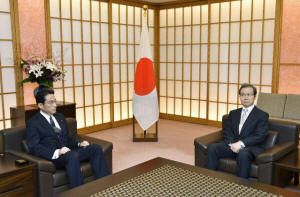|
Japan warns China of deteriorating ties
over East China Sea dispute
 Send a link to a friend
Send a link to a friend
 [August 09, 2016]
By Kiyoshi Takenaka and Eric Beech [August 09, 2016]
By Kiyoshi Takenaka and Eric Beech
TOKYO/WASHINGTON (Reuters) - Japan warned
China on Tuesday that ties were deteriorating over disputed East China
Sea islets, and China's envoy in Tokyo reiterated Beijing's stance that
the specks of land were its territory and called for talks to resolve
the dispute.
The diplomatic tussle comes amid simmering tension as China builds on
outposts in the contested South China Sea, including what appear to be
reinforced aircraft hangars, according to new satellite images.
Ties between Asia's two largest economies have been strained in recent
days since Japan saw a growing number of Chinese coastguard and other
government ships sailing near the East China Sea islets, called the
Senkaku in Japan and Diaoyu in China.
The flurry of Chinese incursions into the waters follows a period of
sustained pressure on China over its activities in the South China Sea,
and China's criticism of what it sees as Japanese interference in that
dispute.
Japanese Foreign Minister Fumio Kishida called in Chinese ambassador
Cheng Yonghua for the second time since Friday and told him China was
trying to change the status quo unilaterally, the Japanese foreign
ministry said.
Kishida told Cheng the environment surrounding Sino-Japanese ties was
"deteriorating markedly", the ministry said.

The Chinese diplomat said after the meeting that he had told Kishida the
islands, which are controlled by Japan, were an integral part of China's
territory and the dispute should be resolved through dialogue.
"I told him ... it is natural that Chinese ships conduct activity in the
waters," Cheng told reporters.
Dozens of Chinese vessels sailed near the islands on the weekend raising
alarm in Japan. Cheng was called in by Japanese Vice Foreign Minister
Shinsuke Sugiyama last Friday over the incursions into what Japan see as
its territorial waters.
The United States, its Southeast Asian allies and Japan have questioned
Chinese land reclamation on contested islands in the South China Sea,
particularly since an international court rejected China's historic
claims to most of that sea last month.
China has refused to recognize the court ruling on a case brought by the
Philippines. Japan called on China to adhere to it, saying it was
binding, but Beijing responded by warning Japan not to interfere.
RAPID CONSTRUCTION
Satellite images taken in late July over the South China Sea show that
hangars constructed on Fiery Cross, Subi and Mischief Reefs in the
Spratly islands, have room for any fighter jet in the Chinese air force,
the Washington-based Center for Strategic and International Studies
(CSIS) said.
The think-tank said in a report there was little evidence that China had
deployed military aircraft to the outposts, but the "rapid construction"
of reinforced hangars suggested that was likely to change.
"They are far thicker than you would build for any civilian purpose,"
Gregory Poling, director of CSIS's Asia Maritime Transparency
Initiative, told the New York Times, which first reported on the new
images.
[to top of second column] |

Japanese Foreign Minister Fumio Kishida (L) meets Chinese ambassador
to Japan Cheng Yonghua in Tokyo, Japan, in this photo taken by Kyodo
August 9, 2016. Mandatory credit Kyodo/via

"They're reinforced to take a strike."
China claims most of the South China Sea, through which $5 trillion
in ship-borne trade passes every year. The Philippines, Vietnam,
Malaysia, Taiwan and Brunei have overlapping claims.
The United States has urged China and other claimants not to
militarize their holdings there, prompting repeated denials from
China that it is doing so. Instead, China has blamed U.S. patrols
and exercises for ramping up tension.
"China has indisputable sovereignty over the Spratly islands and
nearby waters," China's Defence Ministry said in a response to a
request for comment on Tuesday.
"China has said many times, construction on the Spratly islands and
reefs is multipurpose, mixed, and with the exception of necessary
military defensive requirements, are more for serving all forms of
civil needs," it said.
Former Philippines President Fidel Ramos said he was optimistic
about what he has described as an ice-breaking trip to Hong Kong
during which he hoped to meet experts and officials in an effort to
rekindle ties with China soured by the dispute.
Ramos told reporters that he sought to improve economic and tourism
links, by allowing, for example, "more fishing in the common fishing
ground" of the Scarborough shoal in the Philippines' exclusive
economic zone.
"The idea is to use the South China Sea as a place to save lives,
but not to kill people or to destroy lives," he said.
China's 2012 seizure of the Scarborough Shoal, denying Philippine
fishermen access, was among the factors that prompted Manila to seek
arbitration by the international court.
Ramos was Philippines president from 1992 to 1998, when China
occupied Mischief Reef.

Separately, relations between China and another U.S. ally, South
Korea, have been strained in recent days by a decision by South
Korea and the United States to deploy an advanced anti-missile
defense system, to guard against North Korean attacks, that China
fears could be used against its military.
(Reporting by Kiyoshi Takenaka and Nobuhiro Kubo in TOKYO, Eric
Beech and Idrees Ali in WASHINGTON, Venus Wu and James Pomfret in
HONG KONG, and Michael Martina in BEIJING; Editing by Paul Tait,
Robert Birsel)
[© 2016 Thomson Reuters. All rights
reserved.]
Copyright 2016 Reuters. All rights reserved. This material may not be published,
broadcast, rewritten or redistributed. |